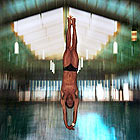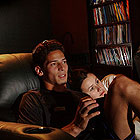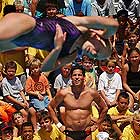|
 |
|
Esta página no está disponible en español. The Orlando Sentinel Frozen in Fear Another chance at an Olympic medal means Orlando diver Mark Ruiz must conquer his demons by RICK MAESE, Staff Writer June 27, 2004
QUICK INFO It's supposed to be a thing of beauty, the diver's dance. The spinning, the twisting, the flipping. For Mark Ruiz, an Orlando diver who returns to the Olympic Games this summer, the feeling starts deep inside his stomach as he stands on a platform 33 feet above the water. The spinning. It climbs its way into his mind. The flipping. And there, it demands attention. The fear. Even though his livelihood, celebrity and honor are earned three stories off the ground, Ruiz is scared of heights. "I know it makes no sense," said Ruiz, 25. "But I am. I get petrified." He was able to suppress it for years, but the fear manifested itself in a big way this month, stealing part of Ruiz's Olympic dream. In the 2000 Games in Sydney, he competed in three events. This August in Athens, he will be in just one, synchronized diving. For Ruiz to succeed and finally win an Olympic medal and realize his dream, he needs to again stifle that fear, something much easier said than done. Ruiz was a favorite to win in the 2000 Games but finished no higher than sixth place, he says, because of a back injury. He carried the fear then, but it did not affect his performance. For years, he was able to block it out. But two weeks ago at the U.S. diving trials in St. Peters, Mo. -- where the nation's Olympic representatives are selected -- it surfaced.
His main goal was to dive the 10 meter in Greece. That event starts on a platform 33 feet high. Divers fall off the platform, twirling and whirling as they drop three stories, reaching speeds that can top 35 mph. Ruiz's performance hinged on his fourth dive, called a back arm-stand triple tuck. He begins the dive standing on his hands, turned away from the water. As he falls backward, he's supposed to tuck into a ball and perform 31/2 somersaults before extending his body and diving into the water. When it comes off right, the dive is like poetry in midair. When the dive goes wrong, it gets filed away alongside painful childhood memories. The day before the competition, Ruiz crashed, dive-speak meaning the jump went awry and Ruiz hit the water hard. The morning of the trials, he crashed again, this time much harder. When he hit the water, his body was flat. He says it felt as if he bounced off the surface. "I don't even remember my head going under," he said. Blood vessels burst in his chest and legs, leaving him with welts that swelled to nearly an inch. His lungs rattled into his ribs, causing him to spit up blood. "Just talking about it scares me," he said. "The smack was real, and it hurt. But the scariest part was not being in control. I was up there, and I didn't know where I was, how many somersaults I'd been through or anything. I was completely lost in the air." He decided to remain in the competition but couldn't stop thinking about his crash. Even on the simplest dives, his heart pounded, his stomach turned and he heard whispers of self-doubt. Still Ruiz was able to make the first three dives. He climbed the steps for the fourth -- the back arm-stand triple tuck. His coach, Jay Lerew, yelled toward Ruiz. "I told him to come back down," Lerew said. "It got to the point where another diver had just hit a good dive, and Mark would have needed to do his perfectly. He wasn't prepared to drill it. I didn't see the point in going through with it. Another hard hit and he would have been in the hospital."
"I've seen a diver do that before, but never at the Olympic Trials," said Ron O'Brien, the technical director for USA Diving and the U.S. Olympic team coach from 1972 to 1996. Ruiz hasn't performed that dive since the brutal crash. He says he'll never try it again. He was able to pull out of the 10-meter event because Ruiz knew he already had a spot on the Olympic team locked up, competing in the synchronized event. Possible trigger of fear But what happens now? Once fear surfaces, can you push it back down? Ruiz has been training five hours a day -- 21/2 hours of aerobic work followed by 21/2 hours of diving -- for more than 15 years. His life has been geared toward competing for a medal in the Olympics. A part of him looked forward to life after diving, but he certainly didn't want it to come this soon. Ruiz will take his fear with him to Greece, and he says he will deal with it the same way he has all these years: by trying to ignore it. "There are many ways for an athlete to face his or her fear," said Dr. Chris Carr, a renowned Indianapolis sports psychologist who has worked with professional and collegiate athletes and serves as a consultant for USA Diving. "Many athletes are able to focus their attention on the controllable aspects of their performance. "If a diver, for example, has five dives from the platform, they can focus all of their attention on the things they have to do to execute the dive perfectly. By putting focus on these controllable aspects, they're suddenly not paying attention to the fact that they're 10 meters off the ground." Traditionally, the fear of heights has been known as acrophobia. The fourth edition of the Diagnostic and Statistical Manual of Mental Disorders, published by the American Psychiatric Association, states that many phobias are actually symptoms of anxiety disorder. Ruiz said he has not visited with a psychologist and has not been clinically diagnosed with a disorder. Carr said it often takes just one traumatic experience to spark a lifelong worry inside competitors, which might get at the root of Ruiz's fear. Asked whether he recalls any traumatic experiences from his childhood associated with heights, Ruiz comes up with nothing. A bit later, though, after searching through memories of missed dives, water crashes and chins slamming into diving boards, Ruiz does remember that one time. . . . "I was 5 years old," he said. "We were still in Puerto Rico. It was at a hotel. Me and my mom, we used to sneak into hotels to use their swimming pools. . . . I jumped and crashed. The lifeguard had to pull me out, and I had to go to the hospital because I had trouble breathing. Maybe that was it." Still, Ruiz didn't feel the fear until he was 14. And at the pool, every climb to the platform was a tactical battle for control of his nerves. Suddenly, he would find himself in a glass elevator, refusing to look down, bracing himself and holding his breath. "As I got older and wiser, I realized how scary it is. It's like, 'What the heck am I doing up here?' " he said. 'Devastating' result in 2000 Ruiz grew up around the water in Toa Alta, Puerto Rico, learning to swim before he was 3. He would swing into the river off ropes tied to tree branches. On weekends, he and his mother would find hotel swimming pools with diving boards. He began taking lessons when he was 9. In the United States, young divers graduate to the 10-meter platform. In Puerto Rico, Ruiz was put on the tall platform early. "It's weird, but that's how they test the kids in Puerto Rico," said his mother, Lydia Torres, 57, who runs a beauty salon in Orlando. "If you don't have fear of going up on the 10-meter platform and jumping, then you're OK for diving. They test your courage. Mark wasn't afraid. He was not afraid of anything." Ruiz was 12 years old when Torres brought him to Orlando to pursue better training. It paid off. In the ensuing years, Ruiz would go on to win 21 national titles and earned a spot on the U.S. national team each of the past 11 years. In 2000, he became the first diver to qualify in three events since Greg Louganis in 1988. With his boyish good looks and an infectious enthusiasm, the spotlight loved Ruiz. It seemed to shine brighter, though, when he failed to bring home a medal. "I felt like I let a lot of people down," he said. "It was devastating." Few knew at the time that Ruiz was diving with a back injury in the 2000 Games. Injuries would be a prominent theme in the years after the Sydney Olympics. He didn't dive once for a seven-month stretch in 2001-02, nursing wrist and back injuries. And in May 2003, Ruiz sat down with his coach and told Lerew he was quitting the sport. Lerew had one last plan. He consulted a doctor in Tampa, and Ruiz received a cortisone shot and had deep massage therapy on his wrist. It hasn't bothered him in a year. With no lingering injuries, Ruiz says he expects to win a gold medal in Greece. In synchronized diving, which is being held for just the second time, two teammates perform identical dives simultaneously, starting from the 10-meter platform. They are judged on form, synchronicity and entry into the water. Ruiz will be diving with Miami's Kyle Prandi. Prandi is the diver who won the 10-meter platform competition at the trials two weeks ago. "Mark is more determined than I've ever seen him," his mother said. "When he went to Australia for the first time, it was like it was good enough to just go to the Olympics. That was his dream. Now he's focused on medaling. He doesn't want to come home without a medal." Torres is still awed when she watches her son dive. She can't figure out how he can make his body spin and flip like that. But she's more impressed with his resolve. She says succumbing to fear before the Olympics is not an option for Ruiz. He has come too far, trained too much and won so many other victories over his fear of heights. "People think we're diving machines, like we're fearless and perfect," Ruiz said. "We're normal. We have troubles with dives. We're scared of some things. We're like everyone else. The only difference is we have to face our fear every day."
|

 In Orlando.
In Orlando.  Down-time.
Down-time. His heart still racing, Ruiz walked down the steps, confronted with confused stares from hundreds of onlookers and dozens of other divers. His chances of qualifying for the Olympics in the 10-meter platform were over.
His heart still racing, Ruiz walked down the steps, confronted with confused stares from hundreds of onlookers and dozens of other divers. His chances of qualifying for the Olympics in the 10-meter platform were over.